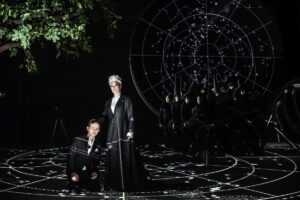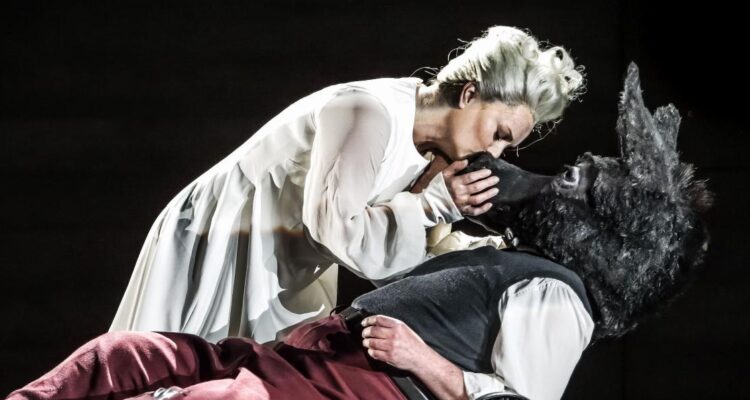Benjamin Britten’s operatic version of Shakespeare’s play famously begins in the enchanted forest outside Athens where mortals encounter the elfin spirits of the night who play tricks on them. The opera dispenses with the first act of the play and we are plunged straight into the supernatural world of Oberon and Tytania and their quarrels. The opening music is marvellous – the strings groaning and sliding from key to key, signalling that this is a world of ambiguity and uncertainty. The Philharmonia Orchestra under conductor Douglas Boyd are suitably magical here and this inventive production by Garsington Opera (in collaboration with Santa Fe Opera) does the other-worldly nature of the work full justice.
Oberon and Tytania have fallen out over a ‘changeling boy’ who lives with her but who is desired by him. With his spirit servant Puck, Oberon plots to humiliate Tytania and gain the boy for himself. Meanwhile four young Athenians enter the forest. They are involved in a complicated love ‘quadrangle’. Oberon orders Puck to intervene to put things right but Oberon’s instructions are very slapdash and Puck’s intervention causes more chaos. Also in the forest are six working men from the city, planning to rehearse a play that they hope Duke Theseus will choose as part of the celebrations of his forthcoming wedding to Hippolyta. One of the workmen, Bottom the Weaver, is transformed into a monster with the head of an ass and Puck cruelly arranges for Tytania to “fall in love” with him. At the end, Oberon feels sorry for all those harmed by Puck’s careless magic and he restores everyone to their right minds The story ends with a less-than-perfect performance of the ‘tragical comedy’ of Pyramus and Thisbee.

The changes to the structure of the original drama mean that the opera focusses very much on Oberon and Tytania and their attendant sprites and fairies. All the more credit to Garsington then for bringing Iestyn Davies and Lucy Crowe to sing the two key roles. Davies is a counter-tenor of the highest quality and brings to the role of Oberon both his stunning voice and a strangely melancholy solemnity which makes the partial reconciliation with Tytania the more moving. Lucy Crowe swings through her challengingly high coloratura passages with panache and finds the right hint of earthy passion for her encounters with Bottom. The lost-in-the-forest lovers are sung by four fine young performers – Caspar Singh, Stephanie Wake-Edwards, James Newby and Camilla Harris – and they throw themselves into the confusions of the forest at night with a refreshing lack of concern for their dignity. Two of the workmen stand out. John Savournin, as a ‘music hall’ Quince, is the ideal comic foil for the bumptious “I’ll play that role” Bottom of Richard Burkhard. And despite the ass’s head, Burkhard plays the mock heroic Pyramus of the wedding play with all the opera seria style needed.
The set is not very sylvan. There are astrolabes and couches – and a broken grand piano – in the forest. There is more than a hint of dreams being analysed on the psychiatrist’s couch – the more so when it is revealed that the drunk wandering on stage at the beginning is Duke Theseus, looking less than happy about his forthcoming marriage. But this is a world of dreams and so coherence is not to be expected. Puck is a slightly sinister joker in this setting and the fairies – admirably represented by the youngsters of the Garsington Opera Youth Company – are all dressed in black and appear through circular trapdoors in the floor of the forest.
Whatever the questions posed by the way the story is told by director Netia Jones – and I liked the way her interpretation played into the dream atmosphere of the music – the very special qualities of the Garsington setting make this a fine version of one of the most intriguing operas of the twentieth century.
Composer: Benjamin Britten
Librettists: Benjamin Britten and Peter Pears (after Shakespeare)
Conductor: Douglas Boyd
Director: Netia Jones
Performers incl: Iestyn Davies, Lucy Crowe, Richard Burkhard, Christine Rice
Running time: 3 hrs (plus Garsington’s long dinner interval)
Until 19 July 2024
Photo credits: Craig Fuller from Georgie Gulliver (Garsington Opera)

